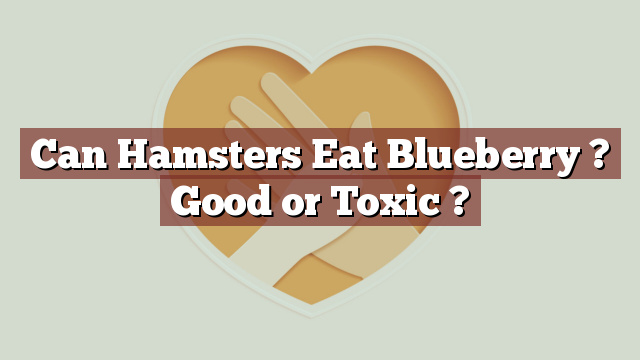Can Hamsters Eat Blueberries? Good or Toxic?
As responsible pet owners, it is crucial to be aware of the foods that are safe for our furry companions. Hamsters, being small and delicate creatures, require a specific diet to maintain their overall health and well-being. One common question that arises is whether or not hamsters can eat blueberries. In this article, we will explore the nutritional value of blueberries for hamsters, their safety and toxicity concerns, potential risks and benefits, and what to do if your hamster happens to consume blueberries.
Nutritional Value of Blueberries for Hamsters: Vitamins, Minerals, and More
Blueberries are not only a delicious treat for humans, but they also offer several nutritional benefits for our hamster friends. These small fruits are rich in vitamins, minerals, and antioxidants, making them a potentially valuable addition to a hamster’s diet. Blueberries are packed with vitamin C, vitamin K, manganese, and dietary fiber. Additionally, they contain small amounts of vitamin E and B vitamins, including thiamine, riboflavin, and niacin.
Can Hamsters Eat Blueberries? Safety and Toxicity Concerns Explored
Fortunately, the answer to the question of whether hamsters can eat blueberries is a resounding yes. Blueberries are safe for hamsters to consume and can be a healthy addition to their diet. However, moderation is key, as with any new food introduced to a hamster’s diet.
Potential Risks and Benefits of Feeding Blueberries to Hamsters
While blueberries are generally safe for hamsters, it is important to keep in mind that they should be given in moderation. Excessive consumption of blueberries can lead to digestive issues such as diarrhea. It is advisable to start by offering a small piece of blueberry to your hamster and observing how they react to it. If they show signs of gastrointestinal discomfort, it is best to discontinue feeding blueberries.
On the other hand, the nutritional benefits of blueberries for hamsters should not be overlooked. The high vitamin C content in blueberries can support the hamster’s immune system, while the antioxidants can help protect against cell damage and promote overall health. The dietary fiber in blueberries can aid in proper digestion and prevent constipation.
My Hamster Ate Blueberry: What to Do? Signs to Watch for and Steps to Take
If your hamster accidentally consumes blueberries without your knowledge or permission, there is usually no cause for immediate concern. However, it is essential to keep a close eye on your furry friend for any adverse reactions. Watch out for signs of digestive upset such as loose stools or changes in appetite. If you notice any concerning symptoms or if your hamster shows prolonged discomfort, it is advisable to consult a veterinarian for guidance.
Conclusion: Blueberries in Moderation Can Be a Healthy Treat for Hamsters
In conclusion, blueberries can be a nutritious and enjoyable treat for hamsters when given in moderation. These small fruits provide essential vitamins, minerals, and antioxidants that can support the overall health of our furry companions. However, it is important to remember that every hamster is unique, and individual sensitivities may vary. Always introduce new foods gradually and monitor your hamster’s reaction. If you have any concerns or questions, consulting a veterinarian is the best course of action.
Thank you for investing your time in exploring [page_title] on Can-Eat.org. Our goal is to provide readers like you with thorough and reliable information about various dietary topics. Each article, including [page_title], stems from diligent research and a passion for understanding the nuances of our food choices. We believe that knowledge is a vital step towards making informed and healthy decisions. However, while "[page_title]" sheds light on its specific topic, it's crucial to remember that everyone's body reacts differently to foods and dietary changes. What might be beneficial for one person could have different effects on another. Before you consider integrating suggestions or insights from "[page_title]" into your diet, it's always wise to consult with a nutritionist or healthcare professional. Their specialized knowledge ensures that you're making choices best suited to your individual health needs. As you navigate [page_title], be mindful of potential allergies, intolerances, or unique dietary requirements you may have. No singular article can capture the vast diversity of human health, and individualized guidance is invaluable. The content provided in [page_title] serves as a general guide. It is not, by any means, a substitute for personalized medical or nutritional advice. Your health should always be the top priority, and professional guidance is the best path forward. In your journey towards a balanced and nutritious lifestyle, we hope that [page_title] serves as a helpful stepping stone. Remember, informed decisions lead to healthier outcomes. Thank you for trusting Can-Eat.org. Continue exploring, learning, and prioritizing your health. Cheers to a well-informed and healthier future!

